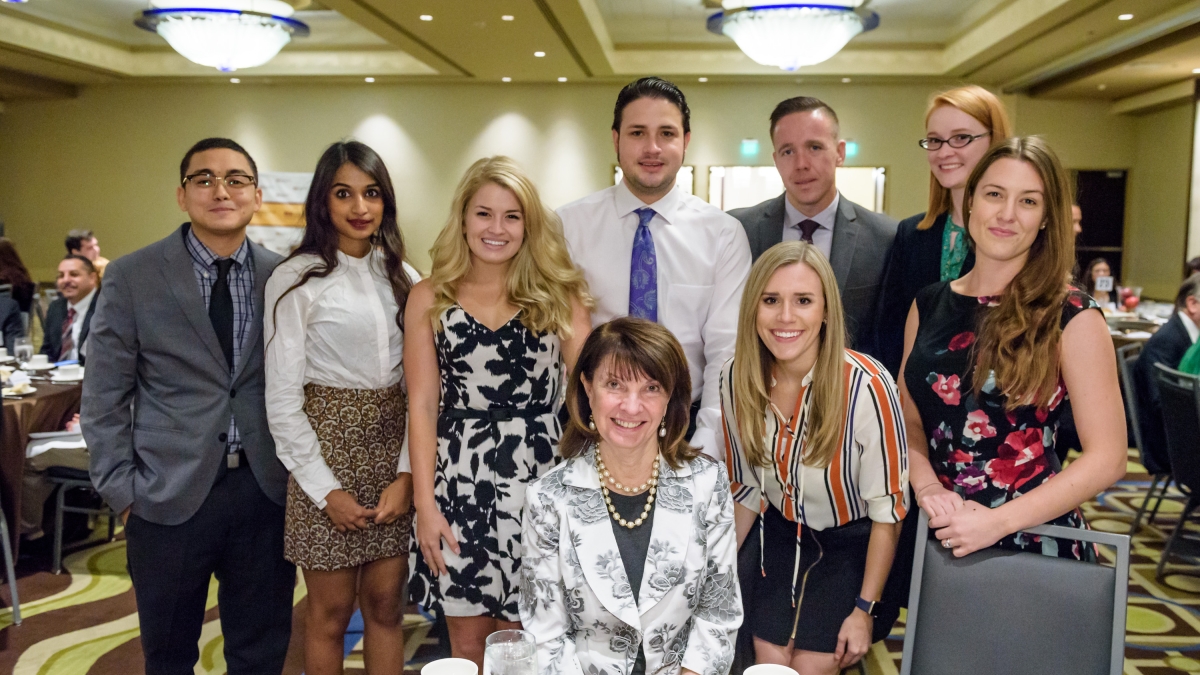ASU Law announces new scholarship program for members of military

Deb Carstens and law students at the annual ASU Law Scholarship Luncheon in October.
The Sandra Day O’Connor College of Law at Arizona State University is offering a new scholarship program specifically for veterans of the U.S. military and their children.
The program will provide four full-ride scholarships for a juris doctor degree and bolster ASU Law’s ongoing efforts to support and expand opportunities for veterans. The scholarship was made possible by a donation from Deborah Carstens, who shares that passion.
“We are especially proud of the students who have served our country, and we want to do everything possible to help prepare them for meaningful careers as they transition back to civilian life,” said ASU Law Dean Douglas Sylvester. “We thank Deb for her generous donation and dedication to creating and enhancing student opportunities.”
Looking for a few good students
Carstens attended the annual ASU Law Scholarship Luncheon in October when a specific segment of a law school video caught her eye. It was an ASU Law student discussing his volunteer work with the Arizona Legal Center. She was impressed. When she noticed the Marine Corps logo on his polo shirt, she was inspired.
Wanting to know more, she asked administrators if they had identified any more Marines trying to get into ASU Law.
“They said, ‘Yes, we are targeting some Marines,’” Carstens said. “I asked, ‘What’s holding them back from attending law school?’ They said, ‘Tuition.’”
Carstens decided to do something about it with a donation to fund four full-ride scholarships through the duration of law school. Two of the scholarships are reserved for individuals who have served in the Marine Corps, and two are reserved for veterans of the Special Forces, such as Army Rangers or Green Berets, Navy SEALs or Marine MARSOC or RECON.
Carstens says it is Arizona State University’s commitment to veterans that inspires her.
“I’ve long been impressed with the Pat Tillman Center for undergrad military students, and now it’s great to learn the law school is providing a second layer of support.”
“I congratulate ASU for paying particular attention to the military,” she said. “America has been at war for 16 years, and too many of us don’t show enough appreciation for the 2 percent of Americans who defend our country by voluntarily serving in the military.”
Although the GI Bill helps veterans and active-duty military personnel pay for college, there are caps on the benefits, which are typically used for an undergraduate degree. The amount of assistance provided by the GI Bill depends on a number of factors, including the specific GI Bill program, the amount of education being pursued, and an individual’s service time. Most veterans and military family members would need to pay out of pocket or receive scholarships if they wanted to pursue a law degree.
Carstens says it’s important for communities to support their local universities. And the law school has a special place in her heart because her late husband, Bill, was a lawyer who also served in the U.S. Marine Corps.
So she and ASU Law are now looking for a few good students.
“The personal qualities that Marines possess make them the kind of students who will succeed at the law school,” Carstens said.
For more information on applying for one of the scholarships, contact Andrew Jaynes at andrew.jaynes@asu.edu.
To learn about giving to your passion or interest, go to GiveTo.ASU.edu.
More Arts, humanities and education
Illuminating legacy at ASU
In 2020, the ASU Art Museum unveiled a groundbreaking installation, "Point Cloud (ASU)," by renowned artist Leo Villareal. The…

Name change for ASU's Mary Lou Fulton Teachers College reflects college's mission
Arizona State University’s Mary Lou Fulton Teachers College has a new name: the Mary Lou Fulton College for Teaching and Learning…

Exhibit to feature artwork inspired by oral histories from Arizona's oldest botanical garden
Though it is Arizona's largest botanical garden and has been an established touchstone of the community for more than 100 years,…